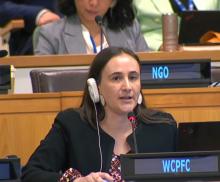WCPFC Highlights Key Role of Tuna RFMOs in Implementing the BBNJ Treaty and Strengthening Global Ocean Governance.

New York, 27 April 2025 – The Western and Central Pacific Fisheries Commission (WCPFC) Secretariat actively participated in the first session of the Preparatory Commission for the Entry into Force of the Agreement under the United Nations Convention on the Law of the Sea on the Conservation and Sustainable Use of Marine Biological Diversity of Areas Beyond National Jurisdiction (BBNJ Agreement), held from 14 to 25 April 2025 in New York.
This inaugural session, formally concluding on 25 April, advanced discussions on governance arrangements, financial and procedural rules and the establishment of subsidiary bodies. It also held a first exchange of views on the development of frameworks for coordination with other bodies, including existing fisheries organizations. Delegates emphasized the importance of transparent, fair implementation and stressed the unique needs of developing States, including Small Island Developing States (SIDS).
During discussions on arrangements for the BBNJ Secretariat's functioning, the WCPFC Secretariat delivered its first statement in a BBNJ-related process. Speaking on behalf of the WCPFC Secretariat, Ms. Hilary Ayrton, Fisheries Management and Compliance Advisor, emphasized WCPFC’s long-standing leadership in sustainable fisheries management across the Pacific.
“The WCPFC, headquartered in the Federated States of Micronesia, entered into force in 2004 and plays a central role in the governance of 60% of the world’s tuna catch,” Ms. Ayrton stated. “Tuna fisheries are central to economic development, food security, and cultural identity in our region. In some SIDS, such as Kiribati, Tuvalu, and the Marshall Islands, tuna-related revenues contribute over 80 to 90 percent of domestically generated income”.
Ms. Ayrton stressed the critical importance of coordinated action, noting that the WCPFC and other tuna Regional Fisheries Management Organizations (tRFMOs) have demonstrated the power of regional collaboration in global fisheries governance.
“The BBNJ Agreement and tuna RFMOs are grounded in a common goal: to safeguard the health and resilience of our ocean and the communities that depend on it,” she said. “By working collaboratively—each within its respective mandate and with respect for the roles and competencies established under international law—we can amplify our collective commitment to effective and inclusive ocean stewardship”.
Delegates at the meeting broadly recognized the necessity of early and effective cooperation between the new BBNJ institutional framework and existing international fishery bodies. The WCPFC Secretariat echoed this sentiment, supporting proposals for the interim BBNJ Secretariat to pursue structured cooperation with frameworks such as RFMOs.
“Constructive cooperation will be critical to ensuring policy coherence, avoiding duplication, and advancing the conservation and sustainable use of marine biodiversity in areas beyond national jurisdiction, while also continuing to support long-term fisheries sustainability,” Ms. Ayrton emphasized.
Specifically, the WCPFC Secretariat endorsed a recommendation that encourages exploring areas of collaboration with other relevant legal instruments and institutions.
“We see this as not only desirable, but essential,” Ms. Ayrton affirmed. “The WCPFC Secretariat stands ready to contribute to this process throughout the lead-up to the second Preparatory Commission and beyond”.
As the meeting concluded, delegates expressed optimism but also acknowledged that significant work lies ahead. The Preparatory Commission Co-Chairs urged participants to bridge remaining divergences to facilitate the timely entry into force of the BBNJ Agreement. The second session of the Preparatory Commission is scheduled for 18-29 August 2025.
WCPFC Media contact: Aaron Nighswander (aaron.nighswander@wcpfc.int)
About WCPFC:
The Western and Central Pacific Fisheries Commission (WCPFC) is an international governmental organization established to conserve and manage tuna and other highly migratory fish stocks across the western and central Pacific Ocean. Headquartered in Pohnpei, Federated States of Micronesia, the WCPFC brings together a diverse range of nations, territories, and other stakeholders to promote sustainable, science-based fisheries management. Visit www.wcpfc.int for more information.

